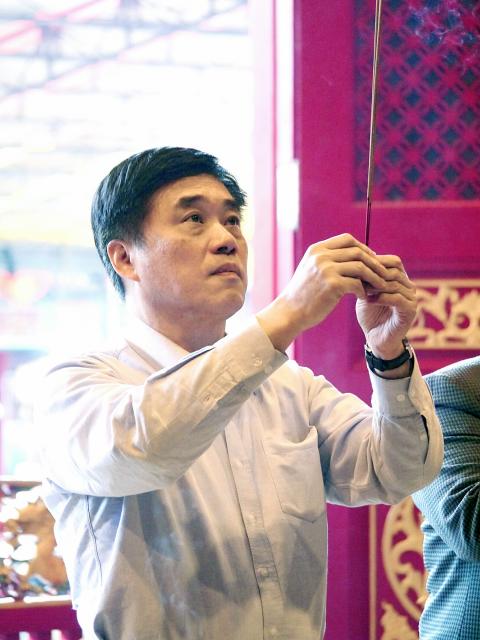Chinese Nationalist Party (KMT) Vice Chairman Hau Lung-bin (郝龍斌) yesterday said his bid for KMT chairperson would gain support from local and waishengren (外省人) factions, allowing him to unite the party, as he is less inclined to take part in politicking.
Waishengren refers to people who fled to Taiwan with the KMT in 1949 after its defeat in the Chinese Civil War.
He had intended to step down as vice party chairman to run in the May 20 race, but was convinced by fellow KMT Vice Chairman Jason Hu (胡志強) not to, Hau said in a radio interview, adding that part of his bid is to show that candidates could run for party chairperson and maintain cordial relations with other KMT members.

Photo: Chien Hui-ju, Taipei Times
The campaign has just started and everything is up in the air, Hau said, adding that should he find his bid failing, he would resign as vice chairman.
Hau said his campaign would be better than his rivals’.
KMT Chairwoman Hung Hsiu-chu (洪秀柱) “should fare worse than I” in the campaign, Hau said, adding that Hung could improve her party administration capabilities.
He said that former vice president Wu Den-yih (吳敦義) had party administration experience, as well as governmental administrative experience, but the 68-year-old’s age was not in his favor and he lacked support from the Huang Fu-hsing (黃復興) military veterans’ branch.
The Huang Fu-hsing is the party’s only special branch. Established in 1956 according to an initiative by then-president Chiang Ching-kuo (蔣經國) to protect the interests of veterans and to ensure that retired military personnel supported KMT policies, the branch holds considerable influence within the KMT.
Hau, the son of former premier Hau Pei-tsun (郝柏村), said that he has a deep connection with the Huang Fu-hsing branch and its members accepted him.
Hau said he had the support of KMT members from central and southern Taiwan after interacting with them over a referendum to maintain an import ban on food from five Japanese prefectures.
He would not run for president in 2020 if his chairperson bid is successful, Hau said, adding that he would ask Hon Hai Precision Industry Co chairman Terry Gou (郭台銘) to be the party’s presidential candidate in such a scenario.
A party chairperson should help presidential candidates, so staking a claim to represent the party in the 2020 race would not be conducive to party solidarity and would interfere with the chairperson’s role, Hau said.
Hau said that Gou had the best chance of being elected president in 2020.
At an event in Yilan County later yesterday, Hau said his assessment was based on pan-blue support for Gou over other party members.
The most important job for a party chairperson is to be impartial and to nominate the best candidate to run for president, Hau said.
The party will focus on winning local government elections next year and from there select the best candidate for the presidential race, he said.

The Ministry of Economic Affairs has fined Taobao NT$1.2 million (US$36,912) for advertisements that exceed its approved business scope, requiring the Chinese e-commerce platform to make corrections in the first half of this year or its license may be revoked. Lawmakers have called for stricter enforcement of Chinese e-commerce platforms and measures to prevent China from laundering its goods through Taiwan in response to US President Donald Trump’s heavy tariffs on China. The Legislative Yuan’s Finance Committee met today to discuss policies to prevent China from dumping goods in Taiwan, inviting government agencies to report. Democratic Progressive Party Legislator Kuo Kuo-wen (郭國文) said

The Ministry of Economic Affairs has fined Taobao NT$1.2 million (US$36,900) for advertisements that exceeded its approved business scope and ordered the Chinese e-commerce platform to make corrections in the first half of this year or its license would be revoked. Lawmakers have called for stricter supervision of Chinese e-commerce platforms and more stringent measures to prevent China from laundering its goods through Taiwan as US President Donald Trump’s administration cracks down on origin laundering. The legislature’s Finance Committee yesterday met to discuss policies to prevent China from dumping goods in Taiwan, inviting government agencies to report on the matter. Democratic Progressive Party

Taiwan and its Pacific ally Tuvalu on Tuesday signed two accords aimed at facilitating bilateral cooperation on labor affairs, according to Taiwan’s Ministry of Foreign Affairs (MOFA). The governments inked two agreements in Taipei, witnessed by Foreign Minister Lin Chia-lung (林佳龍) and visiting Deputy Tuvaluan Prime Minister Panapasi Nelesone, MOFA said in a news release. According to MOFA, the agreements will facilitate cooperation on labor issues and allow the two sides to mutually recognize seafarers’ certificates and related training. Taiwan would also continue to collaborate with Tuvalu across various fields to promote economic prosperity as well as the well-being of their

Sung Chien-liang (宋建樑), who led efforts to recall Democratic Progressive Party (DPP) Legislator Lee Kun-cheng (李坤城), was released on bail of NT$80,000 today amid outcry over his decision to wear a Nazi armband to questioning the night before. Sung arrived at the New Taipei District Prosecutors’ Office for questioning in a recall petition forgery case last night wearing a red armband bearing a swastika, carrying a copy of Adolf Hitler’s Mein Kampf and giving a Nazi salute. Sung left the building at 1:15am without the armband and covering the book with his coat. Lee said today that this is a serious